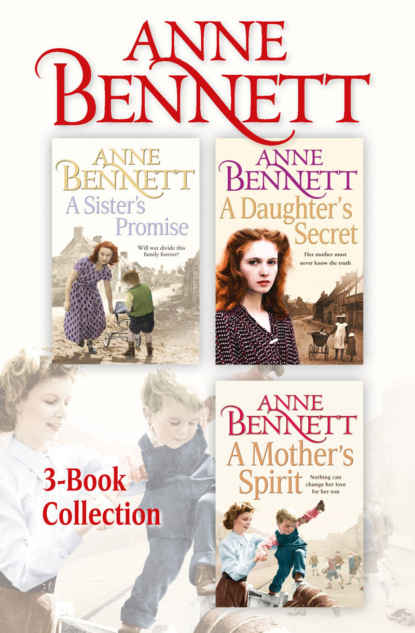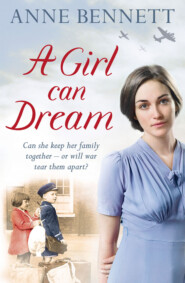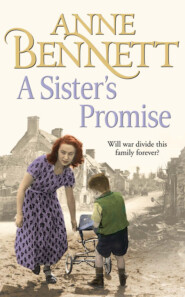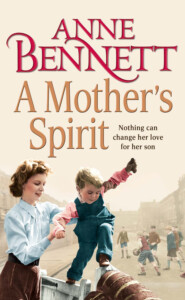По всем вопросам обращайтесь на: info@litportal.ru
(©) 2003-2025.
✖
Anne Bennett 3-Book Collection: A Sister’s Promise, A Daughter’s Secret, A Mother’s Spirit
Настройки чтения
Размер шрифта
Высота строк
Поля
Molly nodded. ‘Mom told me about that and also that the promise wasn’t kept.’
‘That’s right,’ Tom said. ‘And of course that led to years of unease and almost civil war raging through the land. People here don’t want to be dragged in again.’
‘I can see they have a point,’ Molly said. ‘How do you feel?’
‘I think the past should stay in the past,’ Tom said firmly. ‘What’s done is done, and it does no good to be rehashing it all the time. I think if Britain goes to war we could well be dragged into it whether we like it or not. And though I am essentially a man of peace, I could do my bit as well as the next man if I had to.’
‘Yeah, I think that is the best way to look at it really,’ Molly agreed.
‘But I think it would do no harm to get a wireless in,’ Tom said.
‘A wireless! Oh, Uncle Tom!’ Molly hugged herself with delight.
Tom smiled at her. ‘Joe was after advising me to get one; keep abreast of things,’ he said in explanation. ‘Seems a good enough idea to me.’
‘But how will you work it?’ Molly asked. ‘I mean, we had a wireless at home, but it ran on electric.’
‘These have something called an accumulator in the back,’ Tom said. ‘The man in the shop in Buncrana was showing me. He said it has to be charged up every so often and I can do that in Buncrana when I go in on a Saturday. Anyway, he has one on order for me and I am picking it up next Saturday.’
‘Oh, it will be grand to have a wireless,’ Molly said. ‘Ooh, I can’t wait.’
Biddy didn’t think it was grand at all. ‘Waste of more money,’ she growled out as Tom proudly carried it indoors. ‘Boy, money must burn a hole in your pocket.’
‘I am no boy,’ Tom snapped back. ‘And when I ask you to give me something towards anything I buy, then you may express an opinion. This was bought with my own hard-earned money and we have already established that what I do with that is my own business.’
Molly smiled. For her money, Tom could go for a drink every day of the week because he could always cope better with his mother when he had sunk a few pints of Guinness with Jack and the rest of the men. And anyway, she thought, nothing could take the pleasure away from actually having a wireless in the house again.
FOURTEEN (#ulink_90c47825-b129-5366-8d47-37a30ddd5cd7)
England at least was preparing for war. Molly’s grandfather told her of the trenches dug in Birmingham parks and the reinforced brick-built shelters that were going up everywhere. Even the children got involved, and Kevin wrote and told her of the hundreds of bags they had spent ages filling with sand through the hot summer days.
Hilda explained to her about the blackout and the issuing of gas masks.
Not a chink of light to be seen outside and if it is, you face a fine of £200, think on that? And the ruddy gas masks is just horrible. They smell to high heaven, and everyone has a box to put them in that they must carry around their neck in case of gas attacks, they say.
‘What are these gas attacks like, Uncle Tom?’ Molly asked one day in the cowshed.
‘Well,’ Tom said, ‘I can only talk about the last war when the Germans used mustard gas on the soldiers. It buggers up, I mean, damages the lungs so that a person can’t breathe.’
‘Does it kill?’
‘Aye, I believe it can do,’ Tom said. ‘I suppose all these measures are to protect the civilian population. They are sending the children away too, so Joe said. Did your grandfather tell you that?’
Molly nodded. ‘Doesn’t affect them,’ she said. ‘Erdington obviously isn’t considered a high-risk area.’
‘Tottenham is,’ Tom said. ‘But Joe says that Gloria won’t even consider Ben going anywhere.’
‘I don’t blame her either,’ Molly said. ‘But it is scary, isn’t it?’
‘All war is scary,’ Tom said. ‘Only a fool wouldn’t be scared, and though the raids and all won’t happen here, because Ireland has declared itself neutral, we have loved ones to worry about in England that I am certain will soon be in the thick of it.’
‘I know,’ Molly said, and her heart felt as heavy as lead.
On Friday, 1 September, the day many children from England’s cities were travelling to unknown destinations, Germany invaded Poland. Molly’s eyes met those of her uncle as the voice on the wireless told them what this meant. Everyone with a grain of common sense knew already.
Molly was glad the following Sunday that her grandmother wasn’t the kind to linger after nine o’clock Mass. There was going to be an address by the British Prime Minister, just after eleven, and Molly wanted to have the opportunity to listen to it, although she knew what it was going to say.
She wasn’t disappointed either. By 11.15 a.m. on Sunday 3 September 1939, she heard that Britain was at war with Germany, and she felt suddenly numbed with fear.
Everyone, both in Ireland and Britain, expected raids from the air once war between Britain and Germany was official, but it didn’t happen. In fact, nothing did. There were battles at sea and ships sunk which were often reported in the Irish papers. Though Molly could feel sorry about the sailors who had lost their lives, that didn’t adversely affect her loved ones at all.
In fact, what seemed to affect them most was the blackout. As Hilda put it,
Telling you, Molly, you ain’t seen dark like it. You can’t see a hand in front of you. And there’s accidents, of course. I mean, stands to reason. Some of them have been little, like slipping off kerbs and that, and you do feel right daft when you find yourself apologising to the pillar box, or lamppost you have just walked into. But, some of the accidents have been more serious and people have been injured, or even killed on the roads, because the cars and buses and stuff are unlit too. In fact, my old man says he wonders who the enemy is, for Germany has been quiet since the balloon really went up. Calm before the storm, I dare say, but if the government don’t do summat about this here blackout soon, there won’t be the people left to fight Hitler off if he does try to take a pop at us.
Her granddad hated it as much as anyone else, but he was also dreading the rationing that was being introduced in the new year.
I know, though, it will be a fairer system and much better than the last war when the rich bought all before them, so that in some places there was little left in the shops for the rest of us. Anyway, I suppose I must put up with it like everyone else. If you utter a word in complaint about any damned thing these days you are reminded there is a war on. I mean, as if you are likely to forget.
I’ve had word that we are having our Anderson shelter delivered next week. We have the pit already dug and once the shelter is up I will make it as snug as I can for the two of us. Then Hitler can do his worst and we’ll be as safe as houses.
Now, Molly, I want you to listen to me. I never wanted you to go to Ireland in the first place and I know that you would be well aware of that. And you also know that in the normal way of things I would welcome you back tomorrow, but you are safer where you are and I want you to stay put until this little lot is over. Me and Kevin are all right, but you would be put to work in a munitions factory or something like that, and those are the places that will be right in the firing range if any attacks come. I couldn’t bear it if anything happened to either of you children.
Molly could understand her granddad’s concern and was glad too that he was having the Anderson shelter delivered at last. She might not be that ecstatic about the two of them burrowing inside a tin shack buried in the garden but she had to admit that if the raids came, it had to be a safer place to bide than out in the open with no protection at all.
Spring came early in 1940, and, even though she longed to go back to Birmingham, by May Molly thought the countryside had never looked better. The sunshine lent a glow to everything, and many of the trees were heavy with fragrant blossom. Added to this, all the crops were ripening very satisfactorily in the fields. The war seemed a million miles away.
And yet just the previous evening she had heard a man on the wireless tell them of the bombing of Rotterdam that left nine hundred people dead. Molly felt sick, for she knew that this was Blitzkrieg, or lightning war, which the Germans had promised was coming and she also knew what had been done in Rotterdam could be achieved just as well in Birmingham, London or anywhere else they chose.
No one was surprised when Belgium and Holland surrendered, and then towards the end of the month they heard of the defeat of France, the Allied troops trapped on the beaches of Dunkirk and the frantic efforts to rescue them.
‘Don’t the people in Birmingham tell you any of this?’ Tom asked Molly one day in early June as they did the milking together.
‘If they try, like they did in the beginning, then the censor cuts it out,’ Molly said. ‘Now they stick to general things like how hard it is to make the rations stretch and how they have food programmes on the wireless every day and between films in the cinema, and there are hints and tips in the newspapers and magazines. Granddad has taken on an allotment with Hilda’s husband, Alf, though he says he now has a fine crop of potatoes growing in the earth he piled on top of the Anderson shelter.’
‘Which they haven’t had any occasion to use yet.’
‘No, thank God,’ Molly said fervently. ‘It is bound to come, though. The government have recommended putting tape crisscrossing the windows to prevent flying glass in the event of an attack, and the blackout is as stringent as ever, though they are now allowing shielded torches and shielded light on cars and other vehicles.’
‘That must help.’
‘Yeah,’ Molly said with a wry smile. ‘It would, I think, if the batteries for the torches were easier to get hold of. Granddad said he reckons that he could get hold of the crown jewels with less bother. I mean,’ she added, ‘there isn’t much light to be had from the stars and the moon in the smoky Birmingham skies.’
‘And that might be just as well, when all is said and done,’ Tom said.
Molly looked at Tom, but didn’t say anything. She was no fool and knew exactly what he was meaning, for a full moon shining brightly in the sky, as she had often seen it in Ireland, would surely light the way for any enemy planes determined to empty their load over Britain.
Tom saw the look on her face and wished he had kept his big mouth shut.











